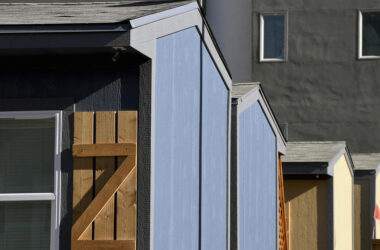The Biden administration is proposing a new way to keep rents around the U.S. from soaring: limit corporate landlords to annual rent increases of no more than 5%, or else they would lose a major tax break.
The proposal comes as many households across the U.S. struggle to afford rents, which have surged 26% nationally since early 2020, according to a recent report from Harvard’s Joint Center for Housing Studies. Although costs for many items are easing as inflation cools, housing prices remain stubbornly high, rising 5.2% on an annual basis in June.
The idea behind the plan is to push midsize and large landlords to curb rent increases, with the Biden administration blaming them for jacking up rents far beyond their own costs. That has resulted in corporate landlords enjoying “huge profits,” the administration said in a statement.
“Rent is too high and buying a home is out of reach for too many working families and young Americans,” President Joe Biden said in a statement. “Today, I’m sending a clear message to corporate landlords: If you raise rents more than 5%, you should lose valuable tax breaks.”
To be sure, the proposal would need to gain traction in Congress, and such a price cap may not be palatable in the Republican-controlled House and some Democrats also potentially opposed.
But the idea, even if it doesn’t come to fruition, could prove popular with some voters ahead of the November presidential election, especially those who feel pinched by several years of rent increases. The proposal is one of a number of strategies the Biden administration is promoting to improve housing affordability, including a plan introduced in March to create a $10,000 tax credit for first-time home buyers.
How the 5% rent cap would work
The rent cap, which would need to be enacted through legislation, would require large and midsize landlords to either cap annual rent increases to no more than 5%. Those that failed to comply would lose the ability to tap faster depreciation that is available to rental housing owners.
The law would apply only to landlords that own more than 50 units, and the Biden administration said it would cover more than 20 million units across the U.S. That “accounts for roughly half of the rental market” in the U.S., according to National Economic Advisor Lael Brainard, who spoke on a call with reporters about the proposal.
Accelerated depreciation is a tax strategy that allows landlords to front-load costs associated with their properties, such as wear and tear. That’s useful because such write-offs can lead to paper losses that allow landlords to offset income from rent, for example. Residential landlords can depreciate their properties over 27.5 years, compared with 39 years for commercial landlords.
The risk of losing the tax benefit would incentivize landlords to raise the rent less than 5% per year because keeping the depreciation would prove to be a better deal financially, senior administration officials said on the call.



